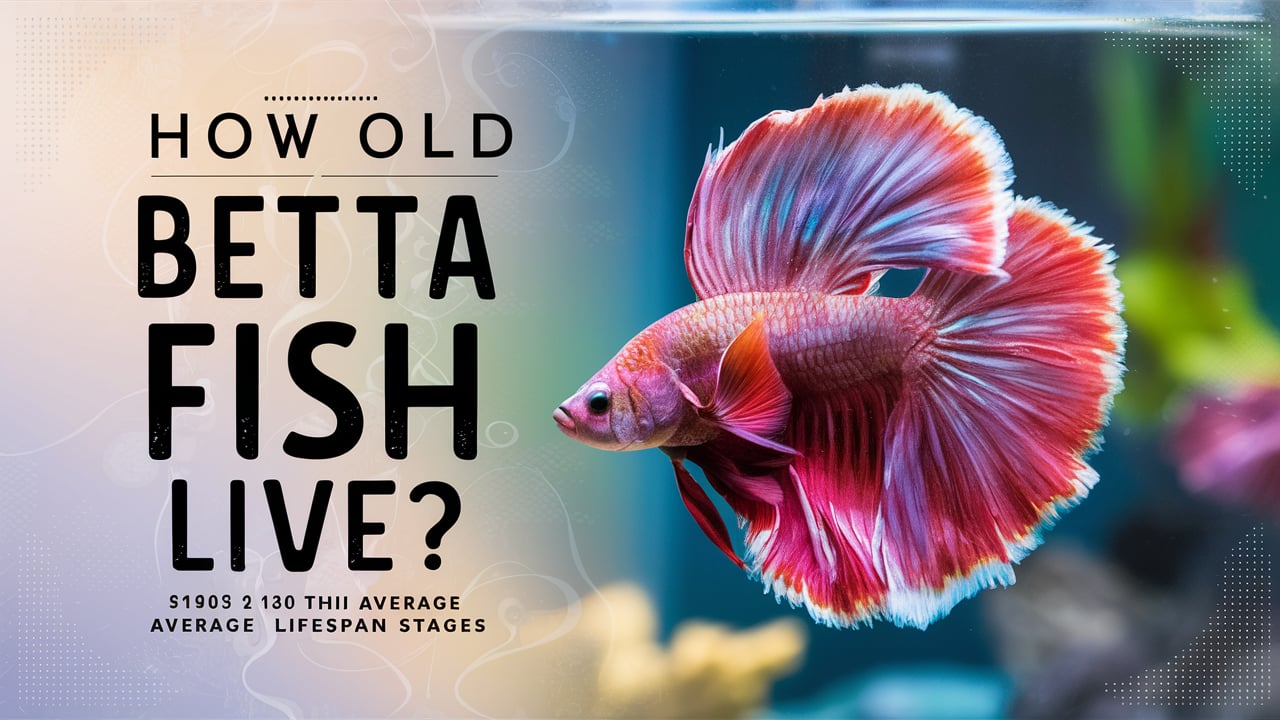How old do Betta fish live? Understanding the lifespan of a betta fish is crucial for providing them with the proper care and ensuring they enjoy a long and healthy life. This exploration, brought to you by Koi Fish Tips, will delve into the factors that influence betta fish lifespan, offering insights into how to maximize their longevity and create a thriving environment for these aquatic jewels.
How Old Do Betta Fish Live?
The lifespan of a betta fish can vary significantly depending on several factors, including genetics, environment, and care. The average lifespan of a betta fish in captivity is 3 to 5 years. However, with proper care and a little luck, some bettas can live even longer, sometimes up to 7 or even 10 years.
Factors Influencing Lifespan
Here are the key factors that influence a betta fish’s lifespan:
Genetics
Breed: Certain betta breeds may be naturally more robust and have a longer lifespan than others.
Individual Variations: Just like humans, betta fish have different genetic predispositions that can influence their lifespan. Some individuals may be more prone to certain health issues, while others are naturally more resilient.
Environment
Water Quality: Maintaining optimal water quality is crucial for a betta’s health and longevity. This includes:
- Regular Water Changes: Regular water changes are essential for removing waste products and maintaining water clarity. Aim for a 25% water change every week.
- Filtration: A good filter is crucial for removing waste products and maintaining water clarity. Choose a filter that is appropriate for the size of your tank.
- Temperature: Betta fish thrive in warm water, with a temperature range of 78-82 degrees Fahrenheit being ideal. Use a heater to maintain a stable temperature.
- pH: The pH level should be slightly acidic, between 6.5 and 7.5. Use a pH test kit to monitor the pH level and adjust it as needed.
Tank Size: A spacious tank is essential for a betta’s well-being. A minimum of 2.5 gallons is recommended, with larger tanks being ideal. This allows for better water quality and provides the betta with more space to swim and explore.
Tank Mates: Betta fish are generally solitary creatures and should not be kept with other aggressive fish. However, some peaceful tank mates, such as snails or shrimp, can be introduced with caution.

Maximizing Your Betta’s Lifespan
To ensure your betta fish lives a long and healthy life, consider these key factors:
Water Quality
- Regular Water Changes: Regular water changes are essential for maintaining optimal water quality. Aim for a 25% water change every week.
- Filtration: A good filter is crucial for removing waste products and maintaining water clarity. Choose a filter that is appropriate for the size of your tank.
- Temperature: Betta fish thrive in warm water, with a temperature range of 78-82 degrees Fahrenheit being ideal. Use a heater to maintain a stable temperature.
- pH: The pH level should be slightly acidic, between 6.5 and 7.5. Use a pH test kit to monitor the pH level and adjust it as needed.
Diet
- High-Quality Betta Food: Choose a high-quality betta food that is specifically formulated for betta fish.
- Live Food: Live food, such as bloodworms, brine shrimp, and daphnia, can provide a nutritious and stimulating diet.
- Frozen Food: Frozen food, such as bloodworms and brine shrimp, can be a convenient alternative to live food.
Stress Reduction
- Tank Size: A spacious tank is essential for a betta fish’s well-being. A minimum of 2.5 gallons is recommended, with larger tanks being ideal.
- Hiding Places: Provide your betta with hiding places, such as plants or caves, to create a sense of security and reduce stress.
- Tank Mates: Betta fish are generally solitary creatures and should not be kept with other aggressive fish. However, some peaceful tank mates, such as snails or shrimp, can be introduced with caution.
What are the signs of an aging betta fish?
As betta fish age, they may exhibit signs of decline, similar to how humans age. While not all bettas will experience every sign, here are some common indicators of an aging betta:
Physical Changes
- Reduced Activity: An aging betta may become less active and spend more time resting at the bottom of the tank.
- Fading Colors: The vibrant colors of a betta fish may become duller or less intense with age.
- Slower Fin Movements: The fins of an aging betta may move more slowly or become less graceful.
- Scale Loss: Some aging bettas may experience scale loss, which can be a sign of underlying health issues.
- Eye Clouding: The eyes of an aging betta may become cloudy or dull.
- Fin Rot: While not always a sign of aging, fin rot can occur more frequently in older bettas due to weakened immune systems.
Behavioral Changes
- Loss of Appetite: An aging betta may lose interest in food and eat less frequently.
Increased Sleep: Older bettas may sleep for longer periods. - Reduced Aggression: Some aging bettas may become less aggressive, while others may become more irritable.
Other Considerations
- Weakened Immune System: As bettas age, their immune systems may weaken, making them more susceptible to diseases.
- Slower Healing: Wounds and injuries may heal more slowly in older bettas.
Conclusion
Understanding the factors that influence betta fish lifespan is essential for providing them with the proper care and ensuring they enjoy a long and healthy life. By maintaining excellent water quality, providing a balanced diet, and minimizing stress, you can give your betta fish the best chance of reaching their full potential and enjoying a fulfilling life.

Bài viết liên quan
Types Of Neocaridina Shrimp: Your Complete Guide
Are you looking to add a splash of vibrant color and captivating charm to your [...]
Jul
Why Are Koi Fish So Expensive? The Secrets Of Their Value
Why are koi fish so expensive? This question often arises among those new to the [...]
Jul
Are Betta Fish Nocturnal? The Secrets Of These Vibrant Fish
Betta fish, with their captivating colors and flowing fins, are a popular choice for aquariums [...]
Jul